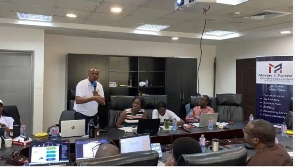 Makers and Partners has reiterated its commitment to strengthen the Internal Audit Function
Makers and Partners has reiterated its commitment to strengthen the Internal Audit Function
Makers and Partners (MAP), a chartered accountancy firm, has reiterated its commitment to continue its capacity-building programme for internal auditors as part of efforts to strengthen the Internal Audit Function of state institutions.
Alfred Aryee, a partner at MAP, who made the disclosure, noted that the initiative formed part of the firm’s corporate social responsibility, and that this year, the firm intends to provide free training in forensic audit to at least 10 state institutions to help build their capacity.
Speaking to the Ghana News Agency (GNA) in an interview on the sidelines of a forensic investigation training workshop for the National Health Insurance Authority (NHIA) internal auditors, he said MAP had so far reached out to the Ministry of Food and Agriculture, the Judicial Service and NHIA.
He told GNA that one of the national insurance scheme’s challenges was funding receipts and expenditures gap and hoped that the training would help the Internal Audit Department of the Authority tackle such challenges.
Aryee said the workshop took participants through the details of effective planning of an investigation, practical and useful skills for evidence gathering and preservation using the appropriate techniques and tools, including adequate documentation of procedures to obtain evidence.
Rudolf Zimmerman, Head of Assurance Department of the Internal Audit Directorate at the NHIA, said participants had acquired the requisite skills on investigation planning, execution, reporting, and ensuring that there was quality assurance as far as investigation was concern.
“One of the challenges that we face internally is about capacity building; the auditing space is becoming more complex; so, it is important to always match with the complexity of the audit procedures, and capacity must be built at all times to remain relevant,” he said.
Zimmerman, who underscored the need for regular training, anticipated that MAP’s workshop would help fill the gaps and help ease the process of external auditing.
He said the knowledge gained during the workshop would enable them to do their auditing within a limited period and with sufficient competence.
Kwasi Ampadu- Kissi, the Managing Partner of Kissi Consult, a chartered accountancy firm, also told GNA that as part of efforts to address the challenges within the auditing space, management of state institutions must create conducive environment for internal auditors to work.
He said management must recognise that internal auditors had been mandated to help them function effectively; adding that management needs to empower internal auditors and treat their reports fairly.
Ampadu-Kissi said there were instances where internal auditors provided reports, and nobody worked on them; stating that reports usually contain a lot of suggestions for improvement – that is for improving the day-to-day activities of the organisation.